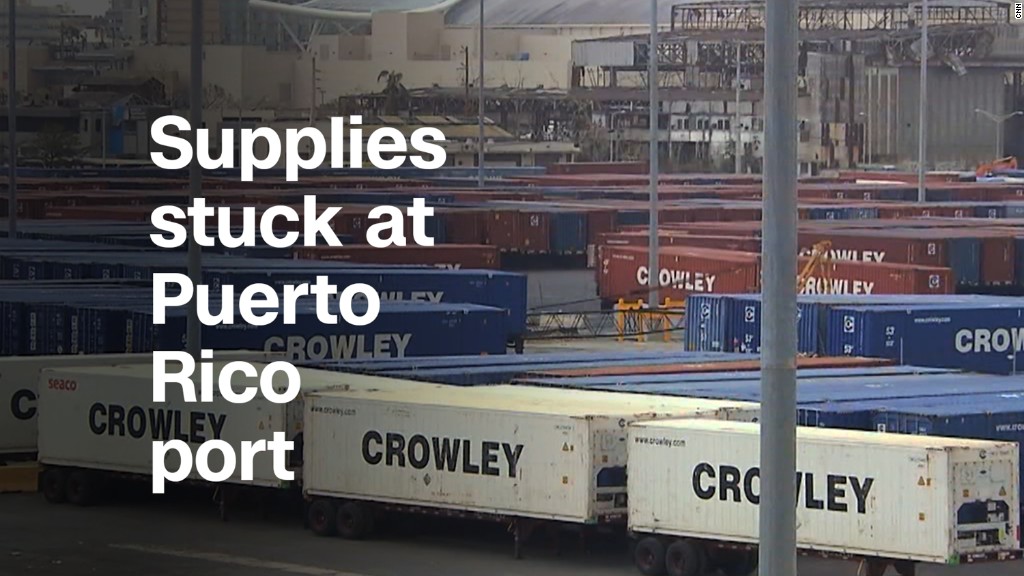
The Jones Act has always been a big problem for Puerto Rico -- long before Hurricane Maria savaged the island.
The law dates back to 1920 and requires all goods ferried between U.S. ports to be carried on ships built, owned and operated by Americans. And those ships are far more expensive to buy and operate than ships flying foreign flags. As a result, it makes just about everything in Puerto Rico more expensive.
A 2012 study from the New York Federal Reserve found that shipping a container from the US East Coast to Puerto Rico cost $3,063. But shipping the same container on a foreign ship to the Dominican Republic nearby cost only $1,504. More broadly, the island loses $537 million per year as a result of the Jones Act, according to a different study conducted in 2010 at the University of Puerto Rico.
Related: Trump grants waiver on shipping rules for Puerto Rico
A 2010 study at the University of Puerto Rico concluded that the island lost $537 million per year as a result of the Jones Act.
Puerto Rican businesses and consumers feel the effects of the Jones Act every day. And the same goes for Hawaii, and to some extent in Alaska. But it gets little attention on the U.S. mainland, since it's often faster and cheaper move goods in the continental U.S. by rail, truck or pipeline.
"The [Puerto Rican] economy is fragile. Even if [the Jones Act] is adding an extra 10 or 20 cents on everything you use, you're talking about thousands of dollars a year for an economy that can't afford it," said Shane Skelton, policy advisor for the Alliance for Innovation and Infrastructure, a think tank that promotes economic efficiency.
"Unfortunately it really only comes to light when we have a catastrophe," he said. "We should look at the impact of this year round."
Government officials in Puerto Rico requested Wednesday that the law be waived temporarily to make it easier to ship emergency supplies to the island, and the Trump administration granted a 10-day waiver on Thursday. It's not clear how much the waiver will help during the current crisis, since the ports are already jammed with supplies that can't be distributed to people in need due to logistical problems on the island.
Related: Vital aid stranded at Puerto Rico's main port
Many critics of the Jones Act, including Republican Senator John McCain, have argued for years that it should be permanently repealed since the higher shipping costs are a drag on Puerto Rico's already struggling economy.
But U.S. shipping lines that benefit from the law have fought successfully to keep it in place. It protects thousands of American maritime jobs, and it's unlikely to be changed in the current protectionist political environment, Skelton said. Still he and other experts say it may cost more jobs than it protects, since businesses on the island buy imported goods which can be shipped at a lower cost on boats flying foreign flags.
Related: Puerto Rico crisis - What the Jones Act controversy is all about
"The rate difference between Jones Act carriers and foreign carriers has led farmers and ranchers on the island to more often source animal feed and crop fertilizers from foreign sources than from U.S. domestic sources, even though commodity prices were stated to be similar," said a 2013 report by the GAO. Most fuel on the island is also bought from foreign countries for the same reason.
But the GAO said it is difficult to determine the true additional cost of shipping because of the Jones Act. The trade group for the U.S. carriers argues scrapping the law would hurt the Puerto Rican economy, not help it.
"American domestic carriers are making some of the largest private sector investments currently underway in Puerto Rico by investing nearly $1 billion in new vessels, equipment, and infrastructure," said the American Maritime Partnership. "They employ hundreds of Puerto Rican American citizens on the island and on vessels serving the market, providing highly reliable, low-cost maritime and logistics services. These private sector jobs and reliable services are important to the long-term recovery of the Puerto Rican economy and would be jeopardized by changes to the Jones Act."


